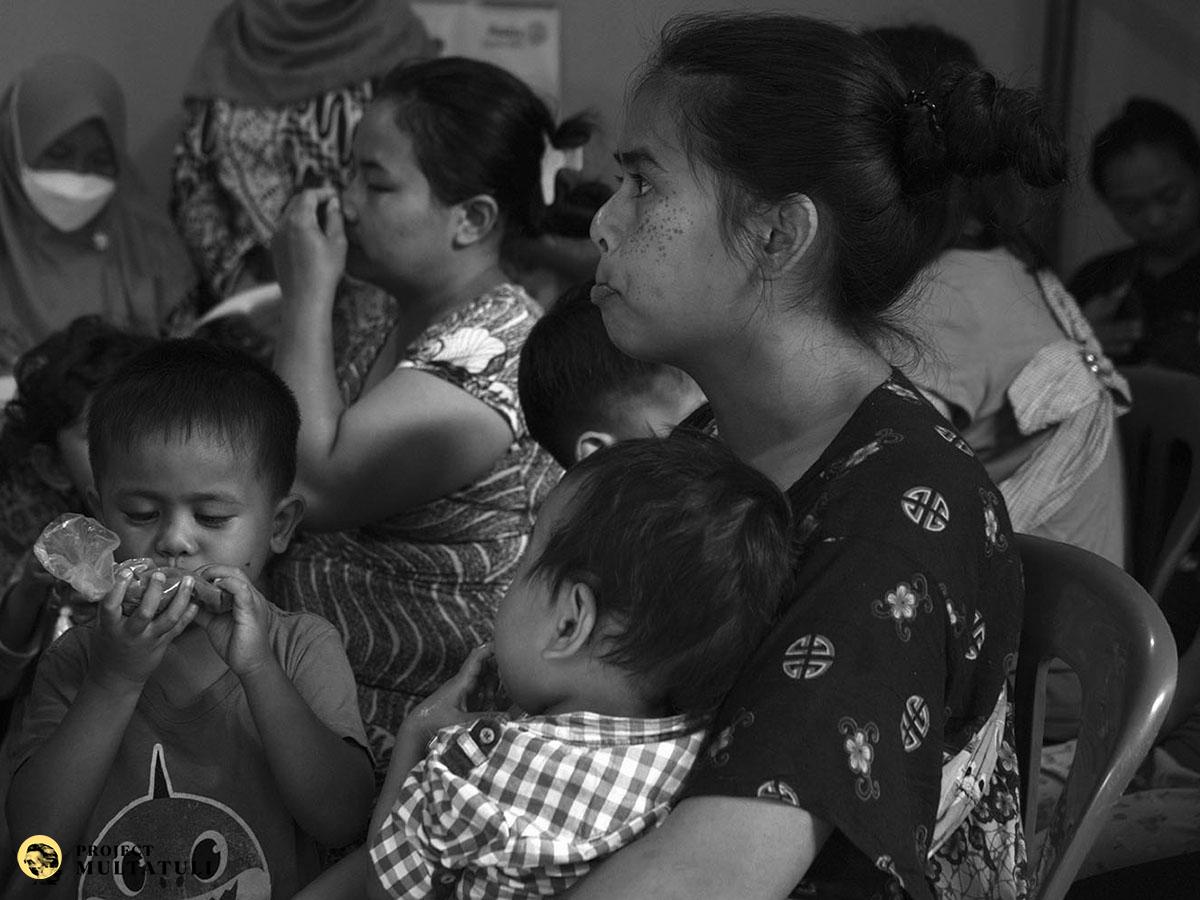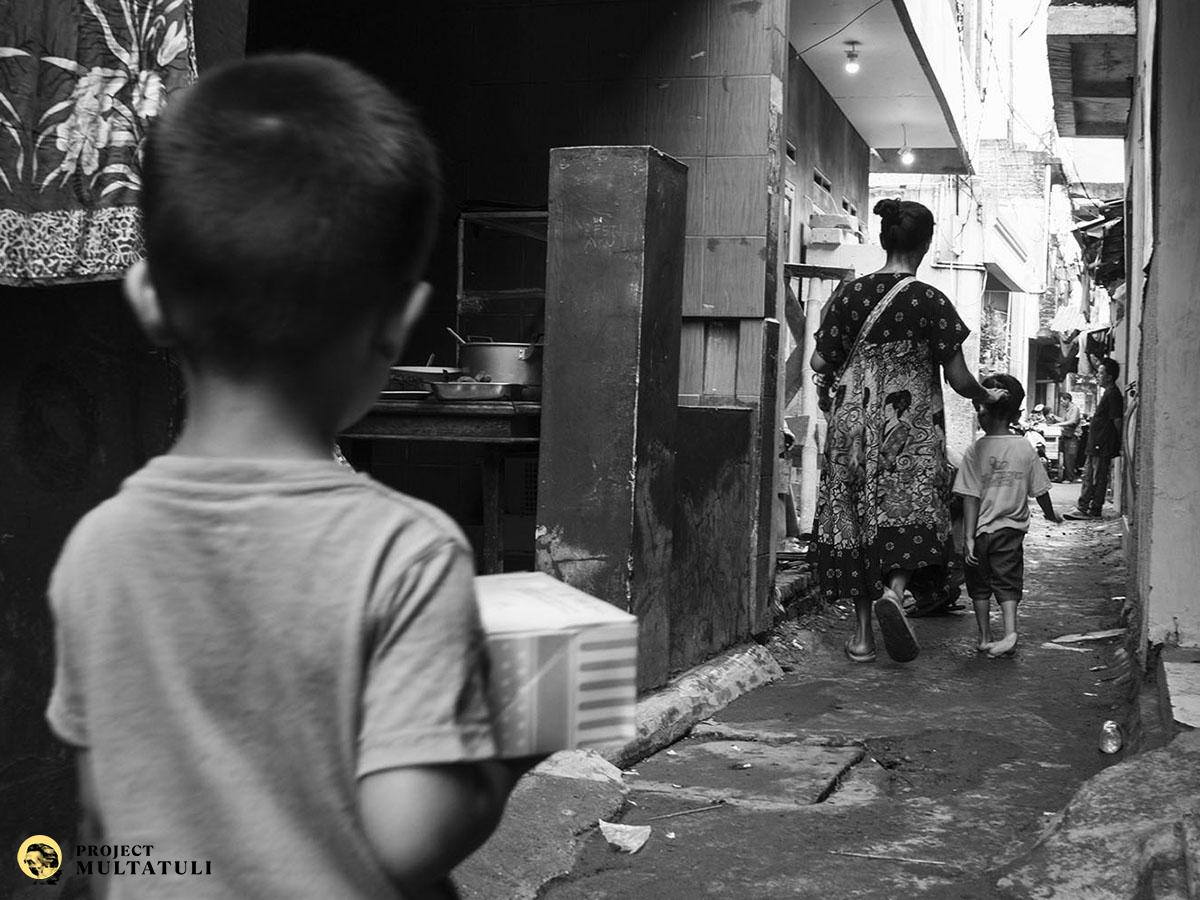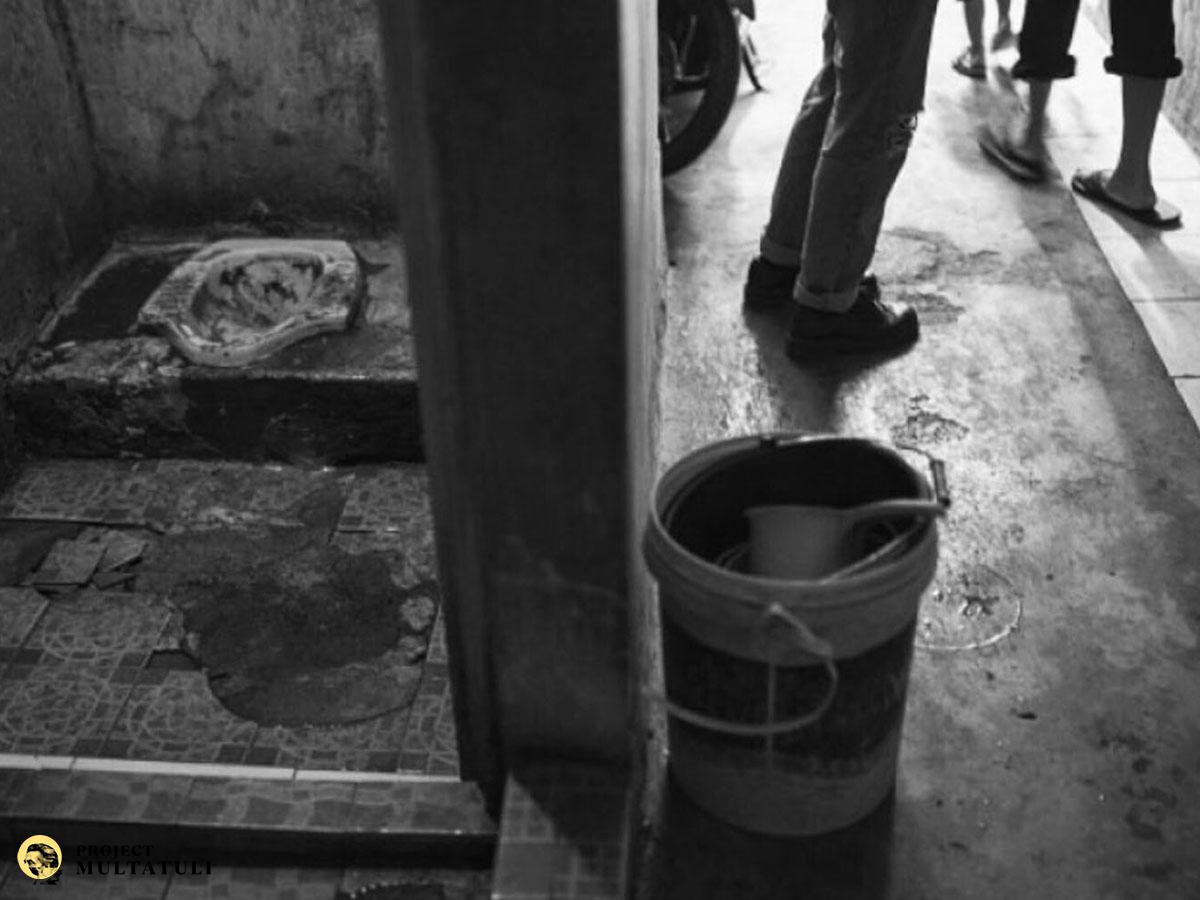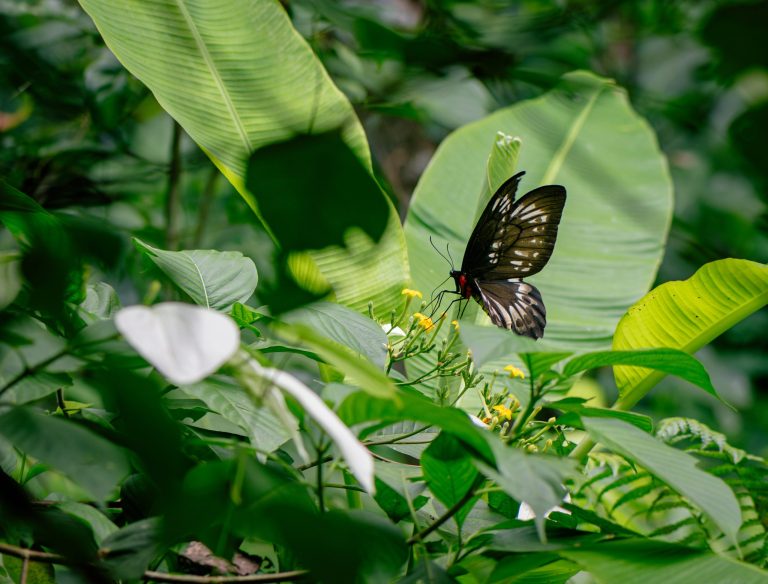It was still early in the morning but Dian Mardiana had been ready to take her 11 month old daughter, Yasmin, to community health center Puskesmas Babakan Tarogong in Bandung, West Java, to get a vaccine shot. This would be Yasmin’s second vaccination after she was born.
However, a doctor at the puskesmas later advised the mother to postpone the shot. There were rash-like red spots on Yasmin’s chest, but her temperature was normal. The doctor suspected the rashes were just some prickly heat, but he advised Dian to postpone the vaccination for a few days anyway to avoid unwanted post-shot fever on Yasmin.
The planned immunization has actually been postponed since Yasmin was born on 9 August 2021. The spread of Covid-19 Delta variant at that time limited people’s access to healthcare. Dian was also afraid to go outside as she did not want to contract the virus.
Dian then brought Yasmin to a midwife for the vaccine shot. However, the midwife refused to administer the shot at that time because the infant’s weight was far below the minimum weight of 2.5 kilograms. Yasmin was only 1.6 kilograms then.
“She should have gotten all vaccinations she needed but the last one was delayed,” Dian said on Tuesday (12/7/2022), adding that her daughter already had the BCG and measle shots.
The pandemic has battered healthcare system and services for newborns and toddlers in Bandung. A number of young children fail to get treatments and health supervision they need. The pandemic also stopped the operations of many integrated health service posts (Posyandu) that usually provide care for mothers and young children. The government then replaced the posyandus with weighting groups at that time but the groups did not run well too.
Bandung is located around 150 kilometers southeast of Jakarta. It is the capital city of West Java province, whose share in the national economy is among the largest in the country.
The experience of giving birth during the pandemic was terrifying for Dian. She did not want to go to hospitals as they treated Covid-19 patients, leading her to the decision to give birth with the help of midwife Atik, who is also a relative. The labor was not smooth and the baby was too small.
“My doctor was fascinated and said that I should had been treated intensively at an hospital but I was afraid of contracting the Covid-19 virus,” Dian said. “Praise to Allah I received a good treatment from the midwife.”
Dian admitted that she received limited care from the puskesmas when she was expecting as the pandemic hit. She then checked her pregnancy at the midwife’s place. She had to pay the USG cost of Rp 125,000 (US$8) to the midwife as her Health Care and Social Security (BPJS) insurance did not cover it.
“The checkups at the puskesmas were free of charge thanks to BPJS. I just needed to pay for the USG cost to the midwife,” said Dian.
In January 2022, little Yasmin was admitted to Hasan Sadikin Hospital in Bandung and was hospitalized for a week and quarantined for three days due to bronchopneumonia. Dian initially thought that Yasmin got Covid-19 but her antigen test resulted negative.
“She must not breathe in cigarette smoke,” Dian said. “I’m always anxious when she coughs but praise to Allah, she is healthy now.”
Yasmin’s growth, at the same time, is stunted. She does not get breastmilk since she was born.
“She drinks formula because she needs a special milk due to her below-standard weight. We also give her a light therapy using a lamp at home, like the one in hospital’s incubators,” Dian said.
***
Around 2 kilometers from Yasmin’s home, 4.5 years old Salim Ahmad Jalil lies weakly in a humid bedroom with no proper sunlight. Weighs in at just 6.7 kilograms, the young boy is unable to support his own body. He cannot sit, let alone stand up on his feet.
Salim is a son of Dede Likartini (42) and Asep Supriatna (38) living in Jamika, Bandung, West Java. They live in a house located in a population-dense area of Bandung, in an alley that is only as wide as two adults standing shoulder by shoulder.
Dede said Salim was born in a surgery as her water was already broken and was swallowed by the infant. Salim’s weight was only 1.5 kilograms, far below the minimum weight of 2.5 kilos. He was treated at Hasan Sadikin Hospital for 11 days and at Kebon Jati Hospital for another three days.
The little baby grows up with several illnesses, such as tuberculosis. Dede said Salim suffered from tuberculosis due to inhaling his late grandfather’s cigarette smoke.

A number of women bring their children for health checkups at an integrated health service post (Posyandu) in Jamika, Bojongloa Kaler, Bandung, West Java. (Bandungbergerak.id/Virliya Putricantika)
Dede said Salim could not eat much rice and other food in the past as he was chocked on those food.
“Now, he can eat some rice, chicken liver, meat, and chicken. He eats three times a day,” Dede told Bandung Bergerak on Friday (22/7/2022). “His usual menu is vegetables, tofu, and sweet soy sauce.”
Salim was once treated for his severe cough and had to have a regular therapy at Hasan Sadikin Hospital after he got better. However, the therapy now stops.
“We once tried to bring him to continue the therapy but the doctor said he should be able to walk first,” she said.
Dede realizes that her son’s body is too small. She is often sad seeing children of Salim’s age play with each other while her beloved son can only lie on his bed, playing with some stuffed toys alone.
***
Just a few meters away from Dede’s house, 19 months old Amora lies on a bed in a 5-square-meter rented room. It had been two days since Amora got fever, cough, and diarrhoea. Amora’s mother, Yuni Cahyati, had brought her to puskesmas for some medications.
This is not the first time Amora falls sick. She got sick multiple times since she was born on 30 December 2020, causing her weight to wildly fluctuate. As a consequence, Amora has never been vaccinated.
A few days before she got sick recently, Amora weighed in at 9.8 kilograms.
“I was surprised seeing her weight dropped from 9.8 kilograms to 9 kilograms and to 8.7 kilograms just now,” Yuni said on Saturday (23/7/2022).
Amora did not get proper care when she was born as the first wave of the Covid-19 pandemic paralyzed the healthcare system. Yuni could not bring her daughter to a posyandu as its service stopped completely at that time.
Amora eventually got the care she needs in early 2022 and was advised to get vaccinations she missed.
***
As many as 86 toddlers or around 7 percent of the total young children in Jamika suffered from stunting, according to the latest official data in February 2022.
Local health officials admitted that they now could not monitor and control the number of children with stunting in the area due to the collapsing healthcare system caused by the pandemic.
“We might be able to control the stunting cases before the pandemic, but we couldn’t after the outbreak hit,” said Ani Sofiyah, Puskesmas Sukapakir’s nutrition officer, on Friday (5/8/2022). She added that her office’s inability to monitor the stunting cases was also because many new young children did not get their routine checkups.
“It also probably because some posyandus’ staffs need to be reminded on how to conduct the kids’ measurement in a proper and correct way,” she said.
However, the stunting problem does not go away even after the pandemic subsides. Some new problems even arise. Many parents now do not take their children to the reopened posyandus. As a consequence, healthcare workers cannot monitor the young children’s weighs and vaccinations.
To close the immunizations gap, the puskesmas workers together with posyandus’ staffs actively find young children who miss their vaccinations. They also provide supplementary food for children with stunted growth through posyandus. Puskesmas are in charge of monitoring the implementation and ensuring that those children get the needed care.

A posyandu’s staff measures a child’s arm in Jamika, Bojongloa Kaler, Bandung, West Java. The staff finds that the child’s arm is too small for a kid of his age. (Bandungbergerak.id/Virliya Putricantika)
However, the supplementary food given for the stunted children was only biscuits provided by the Health Ministry. Even worse, the puskesmas ran out of those biscuits at the time of reporting.
In addition to the non-existent biscuits, the puskesmas provided supplementary vitamins, like vitamin A, every six months. For stunted children, they also gave a special supplement that can be sprinkled on the kids’ meals.
Local healthcare workers face difficulties in educating the parents about parenting, nutrition, and sanitation as well.
“We in the past provided milk to families but some of them sold it. In some cases, the mothers drank the milk, not the children,” said Puskesmas Sukapakir head Hellen Yessi Varinza. “We also gave them ready-to-eat supplementary food but other family members consumed it, not the stunted children.”
Stunting Cases in Bandung’s Most Dense Area
Workers at Puskesmas Babakan Tarogong where Yasmin receives her care also face the similar stunting problem. The puskesmas covers the area of Babakan Asih and Babakan Tarogong, which are the first and second-most population-dense sub-districts in Bandung.
There are 36 stunting cases among 711 toddlers and 146 infants in Babakan Asih, according to the latest official data in July 2022. Meanwhile, Babakan Tarogong has 55 stunting cases among 1,204 toddlers and 255 infants.
Puskesmas Babakan Tarogong nutritionist Nur Salistya Murti said her office was running an intervention program in the form of supplementary food provision for stunted toddlers and pregnant women with malnutrition indications. In 2022, there were 10 toddlers and four expecting mothers who got a 90-day supplementary food assistance.
Lack of funding caused the limited number of assisted toddlers and pregnant women. The puskesmas had to select children with more than one illnesses to be eligible for the assistance.
Murti designed the menu and portion in order to fulfil the recipients’ needed nutrition. She also determined the food delivery schedule.
The puskesmas also provided blood supplement for secondary and high school students in the area in addition to health consultation for mothers to prevent infants born with stunting in the future.
“If I meet a child with stunting, I always talk to the mother, asking about her parenting. In some cases, the mothers have the financial ability but have no knowledge about nutrition,” Murti said. “In other cases, they have the ability but give the day-to-day parenting job to someone who doesn’t understand nutrition.”
She admitted that most of the cases she found was related to low income situation. The parents earned so little so that they had a weak purchasing power.
Further, the residents’ high mobility also made it difficult for the puskesmas to monitor its stunting cases.
Now that the pandemic subsides, many parents are still reluctant to bring their children to posyandus as they get used to door-to-door checkups provided during the outbreak. It needs extra efforts to encourage them to regularly check their kids up at the health care posts.
Murti even has to lure the mothers to come by offering free biscuits. In August, she and the posyandus’ staffs decorated the posts with balloons to make them look like a birthday party venue and offered biscuits or candies for those who came.

A kid holding a snack box follows his mother and siblings to their rented house after a health checkup at a posyandu in Jamika, Bojongloa Kaler, Bandung, West Java. (Bandungbergerak.id/Virliya Putricantika)
“They got used to the door-to-door care,” Murti said. “It is difficult to make them go to the posyandus again.”
Currently, Murti and the posyandus’ staffs were working to register toddlers who have yet completed their vaccinations.
Bandung’s Stunting Hot Spots
Bandung city administration in 2022 added more spots into its list of areas with stunting, making a total of 30 sub-districts. It included Jamika and Babakan Asih sub-districts but excluded Babakan Tarogong, which had more stunting cases compared to Babakan Asih.
In 2021, there were only 15 sub-districts in the list, which also included Jamika and Babakan Asih.
The Covid-19 pandemic hampered monitoring efforts toward first health services like posyandus, Bandung City Health Agency health resources head Sony Adam told Bandung Bergerak on Thursday (4/8/2022).
“This led to an inadequate nutrition supervision toward children in Bandung,” he said. What’s worse is that malnourished children could not get the help they needed, he added.
The agency has implemented several programs to address the issues. It provides an educational program to raise awareness about the importance of a community that takes care of one another’s health. Another program ensures that expecting mothers receive adequate checkups, vaccinations, and consultation, among other things. The agency also encourages pregnant women to give birth in hospitals to reduce mother mortality rate. Low income families are encouraged to take benefit of the BPJS Kesehatan program to cover the cost.
Further, the agency ensures that the stunting prevention measures are implemented to young women by preventing anaemia in female teenagers. Another program provides stunted young children with supplementary food for 90 days.
“The supplementary food provision solves the problem,” Sony said. “We have to look at the root of the problems. If the children are sick, we give them medication. If they lack nutritious food, we provide supplementary meals.”
More Works to be Done
Nutrition doctor and lecturer of Padjajaran University Faculty of Medicine, Gaga Irawan Nugraha, pointed many causes of stunting. The direct causes are nutrition intake and health status. A child with tuberculosis or recurring illnesses is prone to having stunted growth because their illness will reduce their appetite at a time when their body needs more nutrition.
Meanwhile, the indirect causes include parenting, access to food, and availability of clean water and good sanitation.

A sanitation facility in Jamika, Bojongloa Kaler, Bandung, West Java. (Bandungbergerak.id/Arif Danun Hidayah)
The government should have built a healthy habit and provided information about healthy parenting and not only pushes for solutions for indirect causes, such as sanitation, Gaga said. The government used to solve the stunting problem through infrastructure constructions because it shows. However, other measures, such as encouraging children to have breakfast or building a healthy habit among community, are cheaper but unseen.
Gaga emphasized that the government should also focus on noninfrastructure solutions, such as education.
“Please don’t allocate the big budget to [infrastructure development] only just because its result can be seen quickly,” he pleaded with the government. “What’s important is building a habit of having breakfast among children, for instance, or food provision by posyandus.”
Editor: Mawa Kresna
This report is a collaboration of Project Multatuli and Bandung Bergerak. Bandung Bergerak’s coverage on stunted infants in Bandung during the Covid-19 pandemic can be read here.









